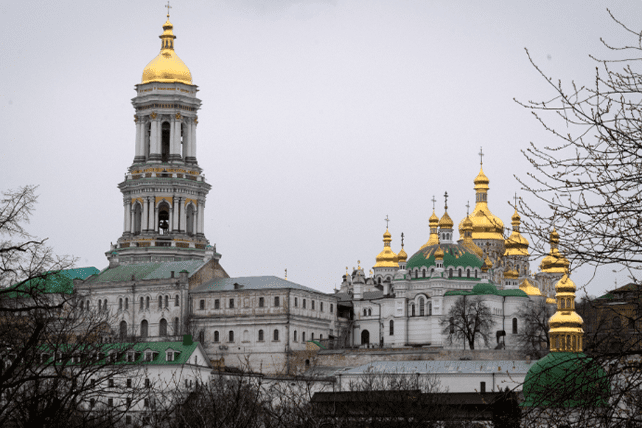(RNS) — The Ukrainian Parliament passed a preliminary vote on Thursday (Oct. 19) for a bill that could ban the Ukrainian Orthodox Church, which has close ties to the Russian Orthodox Church, from operating within Ukraine’s borders.
Draft law 8371 would give Ukrainian authorities power to examine the connection of religious groups in Ukraine to the Russian Federation and to ban those whose leadership is outside of Ukraine. The draft law, under Ukraine’s parliamentary rules, still needs to undergo a second vote, where it may be amended, before moving to President Volodymyr Zelenskyy for his approval before it becomes law.
Since the outbreak of full-scale war between Russia and Ukraine, Russian Orthodox priests in Ukraine and around the world have faced accusations of spying and otherwise working to advance Russia’s political interests. Moscow’s Patriarch Kirill, a close ally of the Putin regime, has provided religious justification for the conflict in sermons and public appearances.
“The Russian Orthodox Church’s connection to the Russian Special Services has a very long history,” Oleksandr Kyrylenko, a scholar of religion and Orthodox Christianity in Ukraine, told Religion News Service.
Last month, Bulgaria expelled three of the highest-ranking Russian Orthodox priests in the country. At the same time, the FBI warned Orthodox communities in the U.S. that Russian intelligence services may be using their churches to recruit assets.
Shortly after the vote on the bill, Ukraine’s state security service, the SBU, accused the Russian Orthodox Church of training mercenaries.
“The Security Service has exposed the leadership of the Russian Orthodox Church for creating its own private military companies on the territory of the Russian Federation,” the SBU said in a statement released on Telegram. “One such private military company called St. Andrew’s Cross is documented to operate out of the Kronstadt Naval Cathedral in St. Petersburg.”
Since the 10th century, Russian and Ukrainian Orthodox Christians had been part of one church. The Moscow Patriarchate itself began as the metropolitan of Kyiv and all Rus, the people who formed the first Russian nation. The relationship between the Russian church and Ukrainian Orthodox Christians began to sour almost a decade ago after Russia’s support for separatist insurgents in Ukraine’s eastern Donbas region and Russia’s occupation of Crimea in 2014.
In 2019, the Ecumenical Patriarch of Constantinople, considered “first among equals” in the Orthodox Christian world and a customary mediator among its many patriarchates, granted a “Tomos of Autocephaly” to Orthodox Christians in Ukraine, allowing them to come under the authority of the patriarch of Constantinople, rather than Kirill.
The move caused the Russian church to break communion with Constantinople and patriarchates that recognized the ruling. In Ukraine, the Orthodox community also divided, with those who embraced autocephaly and styled themselves as the Orthodox Church of Ukraine and those who kept the name Ukrainian Orthodox Church.
The latter, while not accepting Constantinople’s declaration, says it is independent of the Russian Orthodox Church and has publicly criticized Russia, and Patriarch Kiril’s support of the invasion.
The OCU has formally adopted Ukrainian as its liturgical language, ditching Old Church Slavonic, still used by the Russian Church. This summer, the OCU also dropped the Julian calendar and adopted a newly revised one, which, among other changes, moved the date of Christmas from Jan. 7, as it is celebrated in Russia, to Dec. 25.

